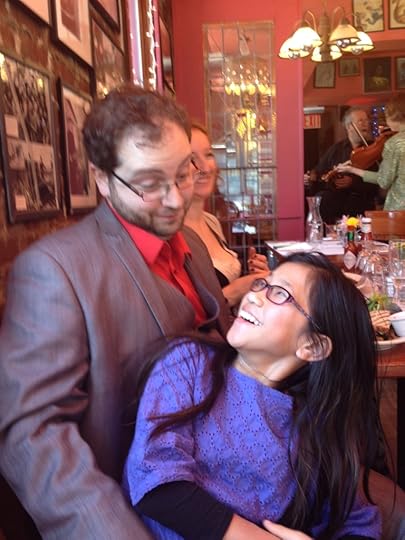An Emissary of Laughter: L.M. Montgomery and the Saving Grace of Humor, by Liz Rosenberg
In a video interview, actress Colleen Dewhurst (who memorably played Marilla Cuthbert in the Canadian “Anne of Green Gables” series) observed that “humor is the great introducer. If you find you have the same sense of humor you feel you’re on less dangerous ground.”

(From Sarah: This is the ninth guest post in “‘A world of wonderful beauty’: L.M. Montgomery at 150,” which began on October 30th and will continue through to Montgomery’s birthday, November 30th. You can find all the contributions to the blog series here . I hope you’ll join the conversations about LMM in the comments here and on social media: #LMM150. Thanks for celebrating Montgomery’s birthday with us!)
The first time I met my husband on our first date, I thought, “He is a perfectly nice man, but he will always be a stranger.” Then he told a funny story that made me laugh, making himself the butt of the joke—and that was the beginning of familiarity, safety, intimacy.
Dewhurst connects her observations about humor to L.M. Montgomery’s life and writings. Here is her quote in full:
“The term kindred spirit which is used so much throughout Anne of Green Gables is that search where we recognize each other—we don’t know why we do. There can be ten people in a room and there’s one that is recognizable and you both realize it when you recognize one another—often through humor. Because humor is the great introducer. If you find you have the same sense of humor you feel you’re on less dangerous ground, and you begin to move closer.”
Perhaps this helps to explain why readers of Montgomery’s books—kindred readers—feel passionate about her work, and connected to one another in mysterious but deep ways. A sense of humor, as Montgomery explains in her first and most famous novel, “is simply another name for a sense of the fitness of things” (Chapter 7).
That initial moment when we first glimpse a sense of humor in the rigid, excessively tidy and dour Marilla Cuthbert is the moment any well-attuned reader breathes a sigh of relief. And the glimmer of this miracle occurs within two pages of their first meeting. Poor Anne has just announced that the mix-up that drives the plot—a girl orphan has been sent to the Cuthberts rather than the expected boy—is “the most tragical thing that ever happened to me!” (Chapter 3)

In response, “Something like a reluctant smile, rather rusty from long disuse, mellowed Marilla’s grim expression.”
Of course, the situation is tragic. Anne has been shunted from borrowed house to house all of her life, in a state of servitude. She has lived in unwelcoming foster homes and in an “unromantic” orphanage and made the best of things—but she has never known full acceptance or family. When she arrives at Green Gables, she believes she has found a real home at last. Instead, Marilla greets her at the door with a cry of disappointment and dismay: “Well, this is a pretty piece of business!” (Chapter 3)
The reception is blood chilling—any reader with a heart feels it at once. But Anne’s melodrama and mispronunciation also contain a touch of the ludicrous. We who understand “the fitness of things” appreciate that sorrow and hilarity travel hand in hand—and so does Marilla.
Humor is a particular honed skill, and not even saints possess it. Marilla’s brother Matthew Cuthbert appreciates Anne’s spirit right away—his heart unquestioningly goes out to Anne—a fellow outsider at the edge of society. Theirs is an unconditional love and friendship from the start.
Marilla is a tougher sell. She provides something quite different but essential for Anne. With a shared sense of humor comes understanding—that’s what Colleen Dewhurst meant. Montgomery often said that she knew her own grandmother Lucy loved her, but there was “no understanding between us.”
If humor can bring perfect strangers to feel as if they are secret friends, then the absence of such a bond creates a deep, hungering loneliness. Maud “met” her best friend, Frede, only after many years of knowing her as a much-younger cousin. But one night they stayed up till dawn, talking, confiding, and making each other laugh. Montgomery never felt closer to anyone than she did to Frede, her soul-mate, friend, and compatriot in laughter and tears. The times they spent together at Park Corner, where Frede lived with her merry siblings, mother, and father, were “the jolliest times” of Maud’s young life. Like many sad children, she loved to laugh.
Humor plays a great role throughout Montgomery’s books—partly because Maud had a wonderful sense of humor—and partly because she was greatly in need of its balancing power. Her life was more tragic than comic. Maud’s mother died when Maud was a toddler, and by the time she was five, Maud had been effectively orphaned when her beloved father wandered off to the far ends of Canada in search of some way to make a living. She was raised thereafter by her grandparents, an unwilling older couple, who, like Marilla Cuthbert at the start, grimly agreed to “do her duty by the child.”
Maud’s grandparents were long past child-rearing age by the time they inherited this big-eyed, bright, moody, sensitive little girl. Their youngest daughter Emily would soon marry and leave home. Emily’s wedding was the first—and the last—occasion of merry celebration in that house where Maud grew up. Like her fictional creation, Anne, she was viewed as a burden and an outsider. No wonder she was so imaginative and funny—how else could she have survived?
I used to teach a class each fall on Literature and Jewish Humor and I learned that the funniest people were also often the saddest. In a class full of laughter and spontaneous comedy routines, invariably at least one student would end up in a breakdown on our city’s psych ward. I grew accustomed to visiting these students of comedy, flowers in hand. This might have seemed funny if it hadn’t been so heartbreaking. And it would have been entirely heartbreaking if it hadn’t also, in its weird way, also been funny. (They all recovered, thank heavens.) Humor is a potent form of self-medication. It is best to become adept at it, if one is to survive. Maud became a champion.
Her entire body of work has been often hailed by critics as uplifting. The term has been used both to praise and to dismiss her. One of her novels—by no means her cheeriest—was distributed to Canadian soldiers in World War One, to comfort them. The merits of her children’s books were debated earnestly by Sunday Schools and librarians who sometimes embraced, sometimes censured them for their “frivolity” and “irreverence.” One admiring contemporary reviewer wrote that her work “radiates happiness and optimism.”
If they had known, Maud wrote, the distress and at times the despair in which she had lived, creating those sparkling books, they would have wondered how she was able to write at all.
But she knew what she was about. She understood that one of her callings in life as in art was to delight the spirits of others. In this she succeeded more brilliantly than I think she ever knew. “Thank God,” she wrote in her journal on October 15, 1908, “I can keep the shadows of my life out of my work. I would not wish to darken any other life—I want instead to be a messenger of optimism and sunshine.”

As a creator of comedy, Maud showed sheer genius. She was a brilliant mimic and satirist with a lightning-fast wit; told funny stories as well as writing them, and created unforgettable comic characters. Sometimes she startled herself into fits of laughter. She lived and wrote largely inside in her own mind, inventing and revising stories. A household member one day observed Maud suddenly come to a halt on the stairs, to shout with surprised laughter, “that’s what I’ll do! That’s just what I’ll do!” And she rushed off to write it down (quoted by Mary Henley Rubio in Lucy Maud Montgomery: The Gift of Wings [2008]).
One might argue that her work only falters when it loses its sense of humor. Or perhaps she lost her “sense of the fitness of things” once the work had slipped away from her control. Pat of Silver Bush, Rilla of Ingleside, and Anne’s House of Dreams strike me as some of the least successful—and least funny of her novels. But these are exceptions rather than the rule. From Anne’s famous misadventures with green hair dye to “setting Diana [her best friend] drunk” (Chapter 27); in a host of fictional mishaps, witticisms, jokes, literary slapstick, sly jabs, and brilliant characterizations, Montgomery exhibits comic genius of every type. It is almost impossible to stay sad or anxious while reading her words.
Montgomery gratefully expressed her own debt to books and writers countless times. She thanked the late author Washington Irving in public and in private for the joy of his enchanting tales. At the end of a hard afternoon she wrote, “Washington Irving, take my thanks. Dead and in your grave, your charm is still potent enough to weave a tissue of sunshine over the darkness of the day. I thank you for your ‘Alhambra’” (April 12, 1903). She would undoubtedly be thrilled to hear that she herself has become an emissary of delight to millions of grateful readers all over the world.
Quotations are from the Complete Journals of L.M. Montgomery: The PEI Years, 1901-1911, edited by Mary Henley Rubio and Elizabeth Waterston (Don Mills, ON: Oxford University Press, 2013).

Liz Rosenberg is the author of more than a dozen novels, books of poems, children’s books and non-fiction, including her biography of L. M. Montgomery, House of Dreams (Candlewick Press) which won a top 10 Goodreads History Books award. She teaches half-time at Binghamton University, and lives part-time in coastal Connecticut. Luckily, her son Eli Bosnick is a professional comic. Her daughter Lily is a semi-pro smiler. Liz sent me this photo of the two of them:

Over the past couple of weeks I’ve been looking for ways of capturing late afternoon light, even on cloudy days, and I took the photos of the autumn leaves that appear earlier in the post.
If you enjoyed this post, I hope you’ll consider recommending it to a friend. If you aren’t yet a subscriber, please sign up to receive future guest posts in “‘A world of wonderful beauty’: L.M. Montgomery at 150.” The next post, “Can’t all Canada agree to like Montgomery (except her poetry)?” is by Audrey Loiselle.
Here are the links to the last two posts, in case you missed them.
L.M. Montgomery and Emily Carr, Worshippers of the Woods, by Marianne Ward
Discovering Anne of Green Gables in Tel-Aviv, by Nili Olay

Read more about my books, including St. Paul’s in the Grand Parade, Jane Austen’s Philosophy of the Virtues, and Jane Austen and the North Atlantic, here.
Guest post copyright Liz Rosenberg 2024; additional text copyright Sarah Emsley 2024 ~ All rights reserved. No AI training: material on http://www.sarahemsley.com may not be used to “train” generative AI technologies.



